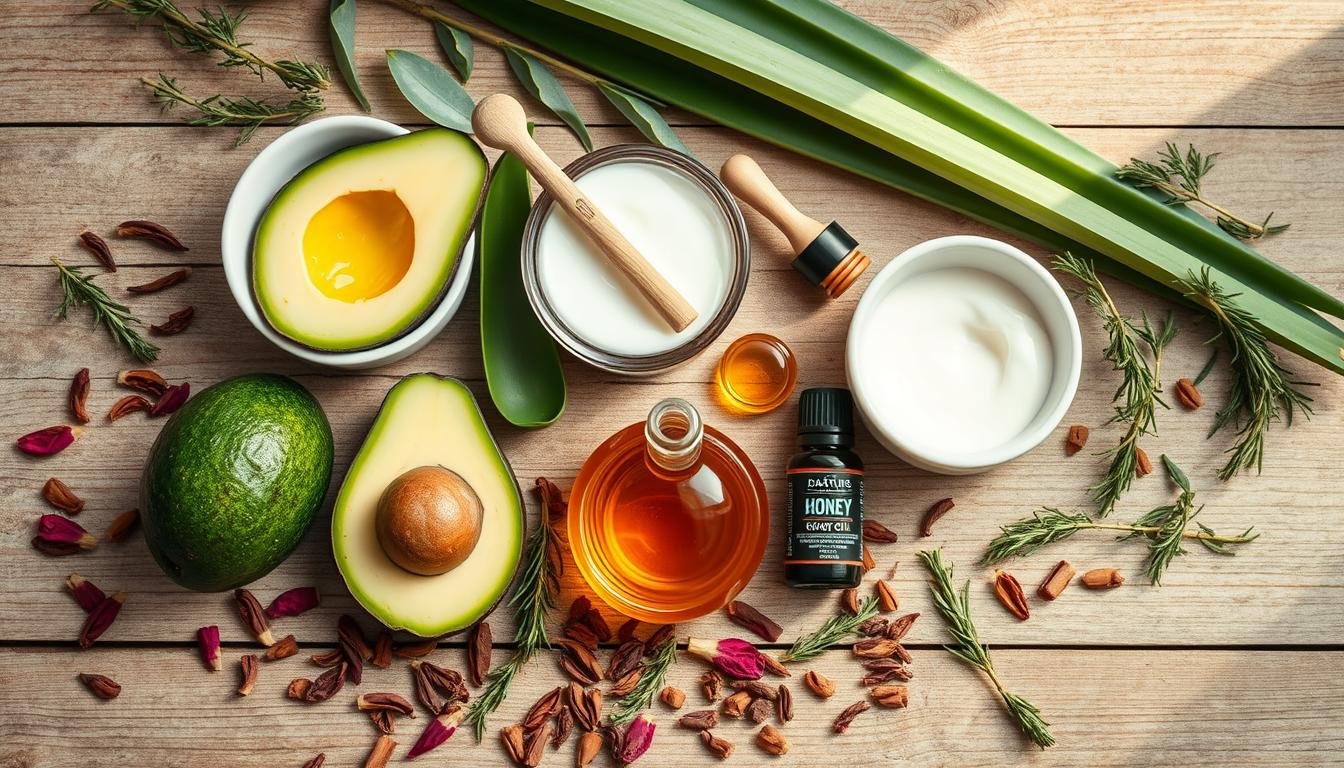Are Natural Hair Masks Effective? A Science-Based Guide
Did you know that according to a 2015 study, coconut oil has been shown to reduce protein loss when used on the hair? This unexpected benefit is just one of many reasons why natural hair masks have become increasingly popular among those seeking healthier, more vibrant locks. In this comprehensive Guide, we’ll delve into the science behind these homemade hair Treatments and explore whether they truly live up to the hype.
Key Takeaways
- Natural hair masks can provide nourishment, hydration, and damage repair for hair.
- Common ingredients like bananas, honey, eggs, and avocado oil offer a range of benefits for hair health.
- Understanding hair structure and the effects of various ingredients is key to choosing the right natural hair mask.
- Proper application techniques are crucial for maximizing the effectiveness of natural hair masks.
- While natural hair masks can be a valuable addition to a hair care routine, they may not be suitable for everyone and have some limitations.
What Are Natural Hair Masks?
Natural hair masks are deep conditioning Treatments made from botanical ingredients found in nature. These nourishing products offer a gentle, yet effective way to revitalize and rejuvenate your locks. Unlike harsh commercial products, natural hair masks are crafted with a focus on using botanical hair masks, herbal hair remedies, and organic hair solutions to address a variety of hair concerns.
Definition of Natural Hair Masks
Natural hair masks are hair care formulas that utilize plant-based ingredients, such as oils, butters, and extracts, to deeply condition and treat the hair and scalp. These masks are designed to provide intense hydration, strengthen hair strands, and improve overall hair health without the use of synthetic chemicals.
Common Ingredients in Natural Hair Masks
- Coconut oil – Penetrates the hair shaft to reduce protein loss and enhance moisture
- Avocado – Contains healthy fats to seal the hair cuticle and reduce damage
- Honey – A natural humectant that helps attract and retain moisture in the hair
- Aloe vera – Soothing and nourishing, with anti-inflammatory properties
- Bananas – Rich in vitamins and minerals to reduce frizz and strengthen hair
- Eggs – Promote hair growth and strengthen hair structure
- Olive oil – Contains squalene to deeply moisturize and protect the hair
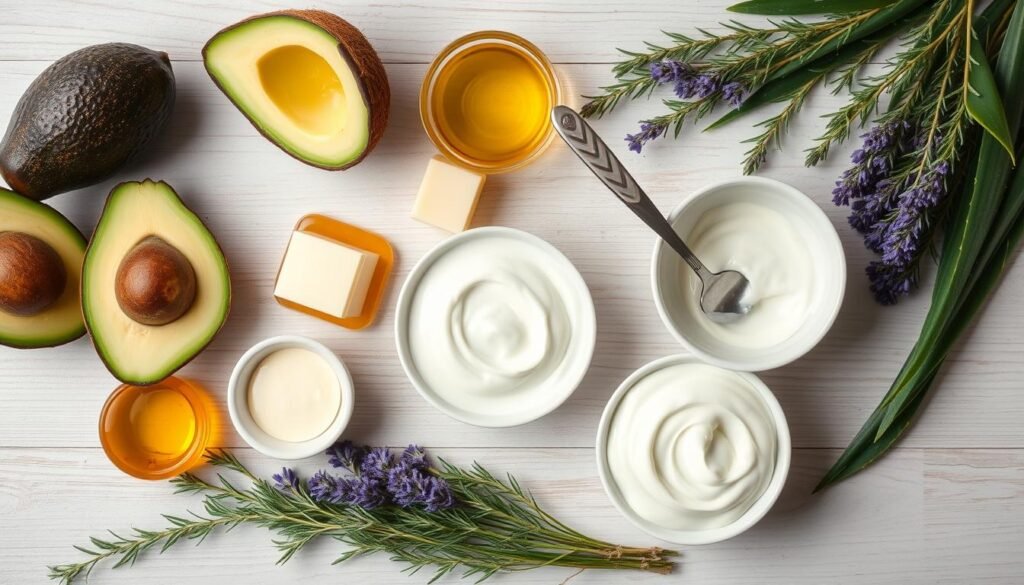
“Incorporating natural hair masks into your routine can be a game-changer for the health and appearance of your hair.”
The Science Behind Hair Health
Understanding the intricate structure of hair is crucial to appreciating the science behind effective hair nourishment. Hair is primarily composed of keratin proteins, which make up 65-95% of its structure. This protein filament has three distinct layers: the protective outer cuticle, the main body known as the cortex that determines hair color, and the central medulla or core.
The shape and arrangement of these layers, along with the disulfide bonds between cysteine amino acids, contribute to the overall hair texture. Curly hair, for instance, tends to have more disulfide bonds, while straight hair has a more uniform structure. Hydrogen bonds also play a significant role in styling and frizz control, as they can be affected by various environmental factors and hair treatments.
Understanding Hair Structure
The key to maintaining healthy, vibrant hair lies in understanding its structural components. Hair nourishment often focuses on targeting the cuticle and cortex layers, as they are the most visible and vulnerable parts of the hair strand. Ingredients that can penetrate these layers and strengthen the keratin proteins within are particularly effective in promoting hair health and resilience.
How Ingredients Affect Hair
The ingredients in natural hair masks can have a profound impact on the overall condition of hair. Moisturizing agents, such as oils and butters, can help prevent water loss and maintain the hair’s natural balance. Keratin-rich ingredients, on the other hand, can help to rebuild and reinforce the hair structure, improving its strength and flexibility.
By understanding the science behind hair health, individuals can make informed choices when selecting and using natural hair masks to achieve their desired results, whether it’s enhanced nourishment, damage repair, or improved manageability.
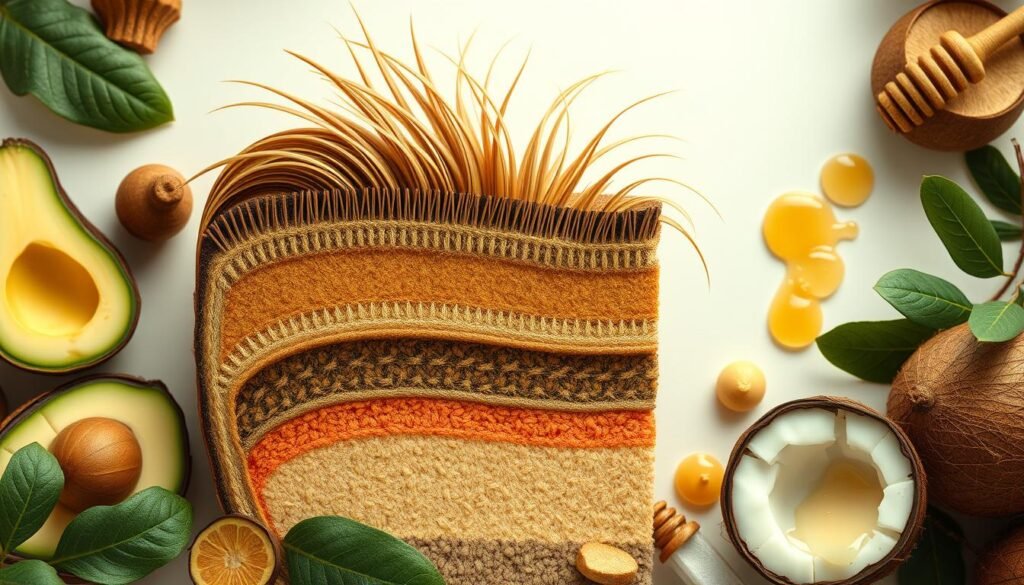
| Ingredient | Benefit | Research |
|---|---|---|
| Coconut Oil | Improves hair moisture and reduces protein loss |
|
| Honey | Moisturizes, reduces breakage, and improves hair condition |
|
Popular Types of Natural Hair Masks
When it comes to DIY hair care, incorporating natural hair masks can work wonders for your tresses. These kitchen-friendly ingredients not only nourish and hydrate your hair but also address various concerns, from dryness to damage. Let’s explore some of the most popular types of natural hair masks that you can easily make at home.
Coconut Oil Masks
Coconut oil is a powerhouse ingredient for hair health. It keeps hair moist and soft, preventing breakage due to its high moisture-retaining capabilities. Coconut oil also penetrates the hair shaft deeply, leading to soft, silky, and shiny locks.
Avocado Masks
Avocados are rich in essential vitamins and minerals that can seal the hair cuticle, adding shine and protecting against heat and everyday wear. The creamy texture of avocado masks helps to eliminate frizz and deeply condition dry, damaged hair.
Aloe Vera Treatments
Aloe vera is a soothing ingredient that can nourish the scalp and provide vitamins for hair growth. These treatments help soothe irritated scalps and promote healthier, stronger hair. Aloe vera can be combined with honey, eggs, or olive oil for enhanced benefits.
When it comes to applying these natural hair masks, the technique and duration vary based on your hair type and the specific mask ingredients. Experiment with different combinations to find the perfect fit for your hair’s needs.
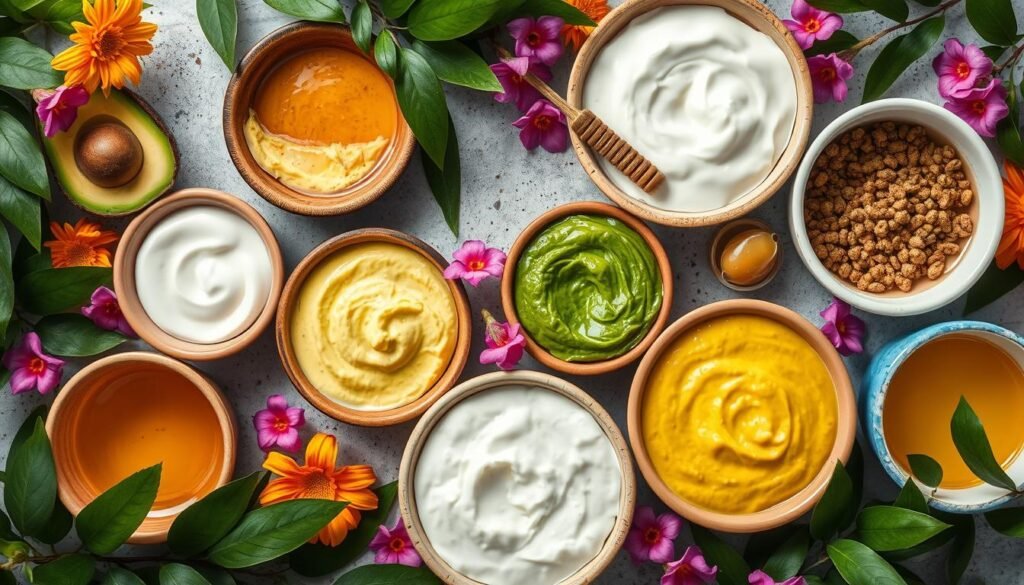
Benefits of Using Natural Hair Masks
Incorporating natural hair masks into your haircare routine can provide a multitude of benefits for your tresses. These intensive treatments are designed to deliver deep nourishment and hydration, improving the overall texture and appearance of your hair.
Nourishment and Hydration
Natural hair masks are formulated with ingredients like hair nourishment and organic hair solutions that work to deeply condition and replenish moisture in your hair. Ingredients such as coconut oil, avocado, and aloe vera can help restore the hair’s natural shine and manageability, leaving your strands feeling soft, smooth, and rejuvenated.
Damage Repair and Prevention
Constant exposure to environmental stressors, chemical treatments, and heat styling can take a toll on the health of your hair. Natural hair masks containing restorative components can help repair existing damage and prevent future breakage. Key ingredients like honey, egg, and olive oil work to strengthen the hair shaft, reducing the risk of split ends and brittleness.
Scalp Health Improvement
The benefits of natural hair masks extend beyond the strands themselves. Ingredients like apple cider vinegar, peppermint oil, and cinnamon can help balance the pH levels of your scalp, promoting a healthy environment for hair growth. Regular use of these masks can also help alleviate issues like Dandruff and maintain a clean, exfoliated scalp.
By incorporating natural hair masks into your haircare routine, you can enjoy the countless benefits of hair nourishment and organic hair solutions, transforming your tresses from dull and damaged to vibrant and healthy.

How to Choose the Right Hair Mask
Selecting the perfect hair mask is crucial for addressing your unique hair needs and concerns. Whether you have dry, fine, curly, or damaged hair, understanding your hair type and the key ingredients to look for can make all the difference in achieving healthier, more vibrant locks.
Identifying Your Hair Type
Before delving into the world of natural hair masks, it’s important to determine your hair type. This will help you identify the specific ingredients and formulations that will work best for your hair. Consider factors like texture, porosity, and scalp condition to narrow down your options.
- For dry or damaged hair, look for nourishing ingredients like avocado oil, coconut oil, and aloe vera.
- Fine, thin hair may benefit from lightweight masks containing proteins to add volume and body.
- Curly or coily hair thrives with moisturizing ingredients like shea butter and honey.
Key Ingredients to Look For
When selecting a natural hair mask, pay close attention to the ingredient list. Avoid products containing silicones and sulfates, which can strip your hair of its natural oils. Instead, seek out masks with the following beneficial natural ingredients for hair:
- Coconut oil: Deeply moisturizes and protects the hair cuticle.
- Shea butter: Provides intense hydration and softness.
- Aloe vera: Soothes the scalp and adds shine to the hair.
- Avocado: Rich in fatty acids to nourish and repair damaged hair types.
- Honey: Helps to strengthen and add luster to the hair.
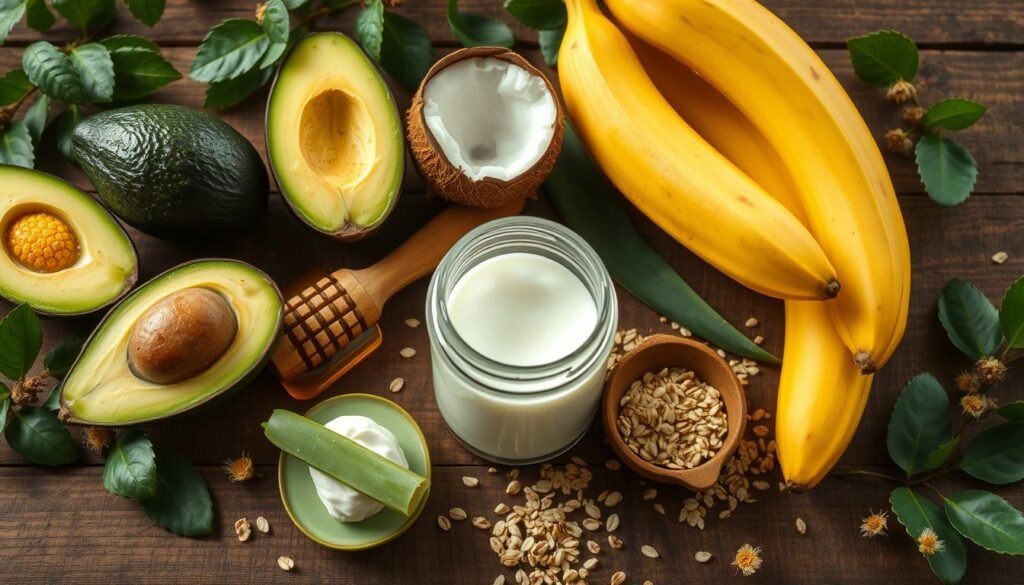
By considering your hair types and selecting a mask with the right combination of natural ingredients for hair, you can unlock the full potential of your tresses and achieve your desired hair goals.
Application Techniques for Maximum Effectiveness
When it comes to getting the most out of your natural hair masks, proper application techniques are key. Start by applying the mask to clean, damp hair for optimal absorption. Use a wide-tooth comb to evenly distribute the product from mid-lengths to ends, avoiding the scalp area. To enhance penetration, cover your hair with a shower cap or wrap it in plastic. Leave the mask on for 20-30 minutes, or longer for more intensive treatments.
Rinsing thoroughly with cool water is crucial to seal the cuticle and lock in the mask’s benefits. The frequency of use will depend on your hair type and condition. As a general guideline, those with dry or damaged hair should use a hair mask weekly, while those with oily hair can apply it bi-weekly. However, it’s essential to adjust the frequency based on your hair’s individual response and needs.
Best Practices for Applying Hair Masks
- Apply to clean, damp hair for best absorption
- Use a wide-tooth comb to distribute the mask evenly
- Cover hair with a shower cap or plastic wrap to retain heat
- Leave on for 20-30 minutes, or longer for intensive treatments
- Rinse thoroughly with cool water to seal the cuticle
Duration and Frequency of Use
- Use weekly for dry or damaged DIY hair care
- Use bi-weekly for oily hair
- Adjust frequency based on hair’s response and needs
By following these application techniques and adjusting the frequency to suit your hair’s unique needs, you can maximize the effectiveness of your natural Hair Treatment application and achieve the healthy, vibrant results you desire.
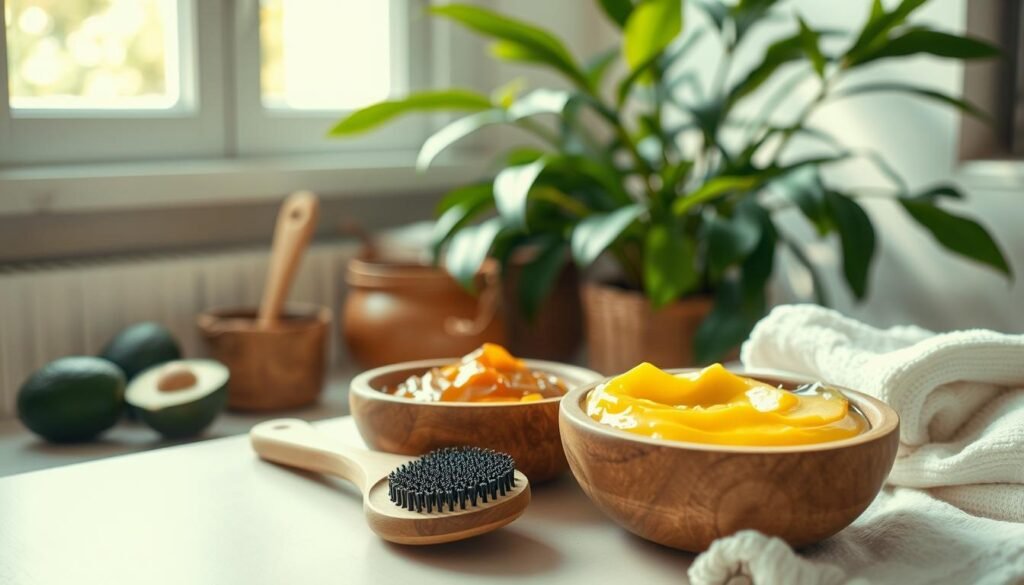
| Hair Type | Recommended Frequency |
|---|---|
| Dry or Damaged Hair | Weekly |
| Oily Hair | Bi-weekly |
Myths and Misconceptions About Hair Masks
When it comes to hair care, there are many common myths and misconceptions surrounding the use of natural hair masks. It’s important to separate fact from fiction and rely on evidence-based information to make informed choices about your hair health.
Common Myths Debunked
One prevalent myth is that “natural always means better.” While natural ingredients can be beneficial for your hair, not all natural products are created equal. Some natural ingredients may actually be less effective or even cause buildup if overused. Another myth is that “more is always better” when it comes to hair masks. Applying excessive amounts of product can lead to a greasy, heavy feel and can actually do more harm than good.
The Importance of Scientific Evidence
To achieve The Best results, it’s crucial to understand the science behind hair care and the efficacy of various ingredients. Research has shown that certain natural ingredients, such as coconut oil and protein treatments, can effectively nourish and repair hair. Understanding the chemistry of hair and how different components interact is key to making informed choices about hair masks and other hair care products.
It’s important to note that individual results may vary based on factors like hair type, texture, and condition. What works for one person may not work for another. Paying attention to your hair’s specific needs and responding accordingly is crucial for maintaining healthy, vibrant locks.

“Natural hair care products have gained popularity in recent years, but it’s important to separate fact from fiction and rely on scientific evidence to make informed choices about your hair health.”
Limitations of Natural Hair Masks
While natural hair masks can provide numerous benefits for hair health, it’s important to be aware of their limitations and potential drawbacks. One of the primary concerns is the risk of allergic reactions or irritation from the natural ingredients used in these treatments.
Many natural ingredients, such as coconut oil, avocado, and essential oils, can cause allergic reactions in some individuals. It’s crucial to conduct a patch test before applying a new hair mask to the entire head, as this can help identify any sensitivity or adverse reactions. Additionally, overusing protein-rich treatments like egg or yogurt-based masks can lead to hair becoming excessively brittle and dry.
When to Seek Professional Help
In some cases, natural hair masks may not be sufficient to address more severe hair damage or persistent scalp issues. If you’re experiencing persistent hair loss, excessive dryness, or other concerning hair and scalp problems, it’s best to consult a professional hair care specialist, such as a dermatologist or trichologist. They can provide a thorough assessment and recommend the appropriate Treatment options, which may include professional-grade products or in-office procedures.
It’s important to note that natural hair masks may not be enough for individuals with chemically treated or severely damaged hair. In such cases, professional treatment may be necessary to address the underlying issues and restore hair health.
| Potential Limitations of Natural Hair Masks | Potential Solutions |
|---|---|
| Allergic reactions or irritation from natural ingredients | Conduct a patch test before full application |
| Protein overload leading to brittle, dry hair | Alternate protein-rich and moisturizing hair masks |
| Insufficient for severely damaged or chemically treated hair | Seek professional hair care treatment |
| Persistent scalp issues or hair loss | Consult a dermatologist or trichologist |
While natural hair masks can be a valuable addition to a hair care routine, it’s important to be mindful of their limitations and potential side effects. By understanding these factors and seeking professional help when necessary, you can ensure The Best possible outcome for your hair treatment side effects and overall professional hair care.
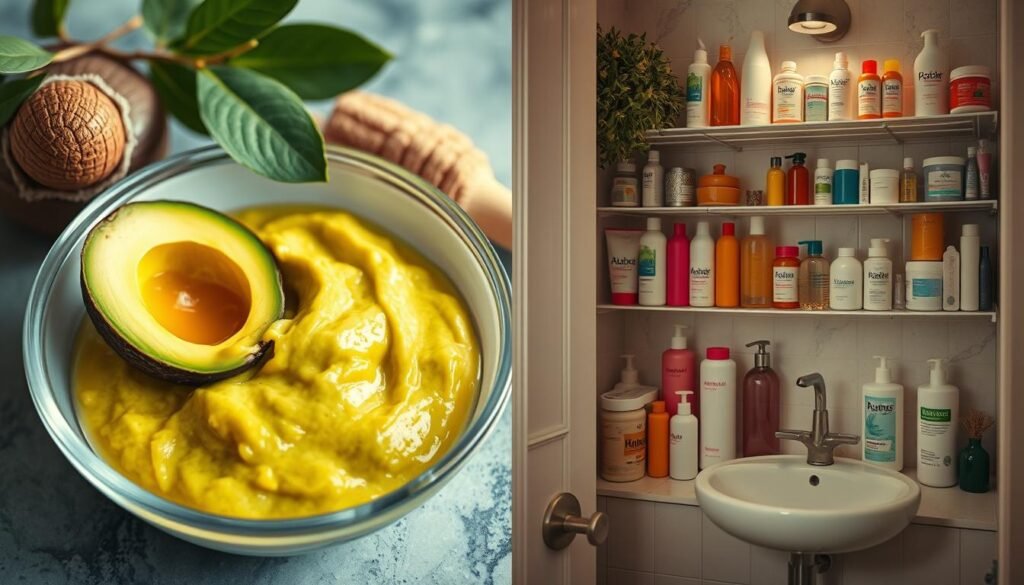
Comparing Natural Hair Masks to Commercial Products
When it comes to hair care, the debate between natural hair masks and commercial hair products continues to spark interest among consumers. Both options offer unique advantages, and understanding the pros and cons of each can help you make an informed decision that best suits your hair’s needs.
Pros and Cons of Natural Hair Masks
Natural hair masks, made with ingredients like coconut oil, avocado, and aloe vera, offer a customizable and gentle approach to hair care. These masks often avoid harsh chemicals found in commercial products, making them a appealing choice for those seeking a more natural regimen. However, the lack of consistency and formulation stability can be a drawback, potentially leading to variable results.
Pros and Cons of Commercial Hair Products
Commercial hair masks, on the other hand, provide convenience and consistent formulations. These products often contain a blend of natural and synthetic ingredients, targeting specific hair concerns with precision. While they may include some synthetic components, commercial masks can offer effective and predictable results. The downside is that they may not align with the preferences of those seeking a completely natural approach to hair care.
Cost-Effectiveness Analysis
When it comes to cost-effectiveness, natural hair masks can be more budget-friendly, as the ingredients can be purchased individually and used to create customized treatments. However, the time and effort required to prepare these masks may be a consideration for some. Commercial hair masks often come with a higher price tag, but they offer the convenience of ready-to-use formulations and may provide a more consistent and targeted approach to hair care.
Ultimately, the choice between natural hair masks and commercial hair products comes down to personal preference, time constraints, and budget. Consider your hair type, specific concerns, and the level of customization you desire when making your decision. By weighing the pros and cons of each option, you can find the hair care solution that best suits your needs and helps you achieve healthy, beautiful locks.
| Feature | Natural Hair Masks | Commercial Hair Products |
|---|---|---|
| Ingredients | Coconut oil, avocado, aloe vera, honey, etc. | Blend of natural and synthetic ingredients, often including essential oils, nutrients, and organic components |
| Customization | High level of customization and personalization | Limited customization options, but offer targeted solutions for specific hair concerns |
| Consistency | May lack formulation stability and consistency | Offer consistent and predictable results |
| Convenience | Require time and effort to prepare | Readily available and easy to use |
| Cost-Effectiveness | Generally more cost-effective in the long run | May have a higher upfront cost |

The natural vs. synthetic hair care debate continues to evolve, with consumers increasingly seeking products that cater to their specific hair needs and preferences. By understanding the pros and cons of both natural hair masks and commercial hair products, individuals can make an informed decision that aligns with their personal goals, budget, and overall hair health.
Conclusion: Are Natural Hair Masks Worth It?
Based on the scientific evidence and practical insights explored in this article, natural hair masks can be a valuable addition to your hair care routine. These plant-based treatments offer a range of benefits, from deep nourishment and hydration to damage repair and scalp health improvement.
Summarizing the Benefits
When used consistently and in accordance with your specific hair needs, natural hair masks can help combat dryness, frizz, and lackluster locks. The inclusion of ingredients like coconut oil, avocado, and aloe vera can work to strengthen hair strands, promote growth, and restore a healthy shine.
Final Recommendations and Best Practices
To maximize the effectiveness of natural hair masks, it’s essential to Choose products tailored to your hair type and concerns. Applying the masks properly, leaving them on for the recommended duration, and incorporating them into a holistic hair care routine can yield the best results. While natural hair masks may not be a cure-all, they can be a valuable tool in your quest for healthier, more vibrant hair.
FAQ
what are natural hair masks?
Natural hair masks are deep conditioning treatments made from ingredients found in nature, such as bananas, eggs, avocado oil, honey, coconut oil, olive oil, and aloe vera. They are designed to nourish, hydrate, and repair damaged hair.
what are the common ingredients in natural hair masks?
Common ingredients in natural hair masks include bananas (reduce frizz, antimicrobial properties), eggs (promote hair growth, strengthen hair), avocado oil (seal hair cuticle, reduce damage), honey (humectant, stimulate skin cell growth), coconut oil (penetrate hair shaft, reduce protein loss), olive oil (contains squalene for moisture), and aloe vera (anti-inflammatory, vitamins for hair nourishment).
How does the structure of hair affect its health and appearance?
Hair is a protein filament composed of 65-95% keratin. It has three layers: the cuticle (protective outer layer), the cortex (main body, determines hair color), and the medulla (central core). Hair texture is determined by follicle shape and disulfide bonds between cysteine amino acids. Curly hair has more disulfide bonds, while hydrogen bonds affect styling and frizz. Moisturizing ingredients in hair masks can prevent water loss and maintain hair health.
What are some popular types of natural hair masks?
Some popular types of natural hair masks include:
– Coconut oil masks, which penetrate the hair shaft and reduce protein loss and dryness
– Avocado masks, which contain minerals like folic acid, iron, and magnesium to seal the hair cuticle
– Aloe vera treatments, which soothe the scalp and provide vitamins for hair nourishment
What are the benefits of using natural hair masks?
Natural hair masks provide deep nourishment and hydration, improving hair texture and appearance. They help repair damage from styling, environmental factors, and chemical treatments. Ingredients like aloe vera and coconut oil can improve scalp health, reducing Dandruff and promoting hair growth. Regular use of hair masks can prevent future damage by strengthening the hair shaft and maintaining moisture balance.
How do I choose the right natural hair mask for my hair type?
Choosing the right hair mask depends on your hair type and specific concerns. For dry hair, look for ingredients like avocado oil and aloe vera. For fine hair, use lightweight masks with proteins. Curly hair benefits from moisturizing ingredients like coconut oil and shea butter. Consider porosity, texture, and scalp condition when selecting ingredients. Avoid silicones and sulfates in natural hair masks.
How do I properly apply a natural hair mask?
Apply hair masks to clean, damp hair for best absorption. Use a wide-tooth comb to distribute the mask evenly. Cover hair with a shower cap or plastic wrap to retain heat and enhance penetration. Leave the mask on for 20-30 minutes, or longer for intensive treatments. Rinse thoroughly with cool water to seal the cuticle. Use hair masks weekly for dry or damaged hair, and bi-weekly for oily hair. Adjust the frequency based on your hair’s response and needs.
Are there any myths or misconceptions about natural hair masks?
Yes, some common myths include “natural always means better” and “more is always better.” Not all natural ingredients are beneficial, and overuse can lead to buildup. Scientific evidence supports the efficacy of certain ingredients like coconut oil and protein treatments. It’s important to understand the chemistry of hair and ingredients to make informed choices, as results may vary based on individual hair type and condition.
What are the limitations of natural hair masks?
Natural ingredients can cause allergic reactions or irritation in some individuals, so it’s important to patch test new ingredients before full application. Overuse of protein treatments can lead to brittleness. Some hair damage requires professional treatment beyond DIY masks. Consult a dermatologist or trichologist for persistent scalp issues or severe hair damage, as natural masks may not be sufficient for chemically treated or severely damaged hair.
How do natural hair masks compare to commercial hair products?
Natural masks offer customization and avoid harsh chemicals but may lack consistency. Commercial products provide convenience and formulation stability but may contain synthetic ingredients. Natural masks can be more cost-effective but require time and effort to prepare. Commercial masks often contain a blend of natural and synthetic ingredients for targeted results. Consider your personal preferences, time constraints, and budget when choosing between natural and commercial options.
